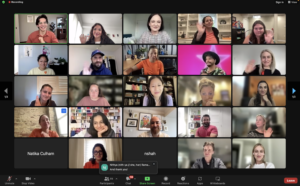
In a world that is increasingly recognizing the importance of diversity, equity, and inclusion, Hunter C. stands out as a storyteller and advocate with a mission that goes beyond buzzwords.
Today we had the privilege of hearing from him, and his inspiring mission to infuse Treaty values into the narratives and practices of organizations.

Hunter’s journey into the world of advocating for Indigenous values and reconciliation was not an overnight transformation. It began with a deep recognition of systemic biases and inequalities during his training. This revelation set him on a path of discovery, understanding, and change.
Alongside his sister, Jacquelyn, he combines his powerful storytelling skills with her systems thinking expertise. Together, they started Naheyawin where they apply Indigenous teachings to repair the very systems that perpetuate biases and inequities.
During our conversation with Hunter, he took us on a journey through the Reconciliation process from an Indigenous perspective. It began with a smudge ceremony, a sacred ritual that cleanses the mind, body, and spirit. This ceremony sets the stage for the profound wisdom Hunter shared with us.

One of the key takeaways from our conversation was the significance of building a sense of community. In the Indigenous worldview, this is not just about coexisting but emphasizing peaceful coexistence. It’s about celebrating uniqueness and upholding sovereignty as a means to prevent conflicts.
In the nêhiyawak language, the word for Treaty is ‘nistotamowin‘. It encompasses the spirit and intent of walking together in a good way. But there’s a deeper meaning to ‘nistotamowin‘ that Hunter explained:
The significance of ‘three’ lies in representing the three essential components of understanding between peoples and the specific order in which they should be approached:
On this day, we come together to pay homage to the resilience, dignity, and strength of survivors. We also recognize the survivors who have carried the weight of this history forward. As a nation, we must acknowledge this painful past, learn from it, and commit to the path of healing, reconciliation, and justice for all Indigenous peoples.
To learn more about Hunter’s work and explore Naheyawin, an agency dedicated to helping organizations adopt Indigenous principles, visit their website here
Lastly, during our discussion with Hunter, he recommended some books that provide invaluable insights into the path of reconciliation and understanding:
In a world that often feels divided, the wisdom shared by Hunter Cardinal reminds us of the power of understanding, collaboration, and embracing Treaty values. It’s a path that leads not only to reconciliation but to a brighter and more inclusive future for all.